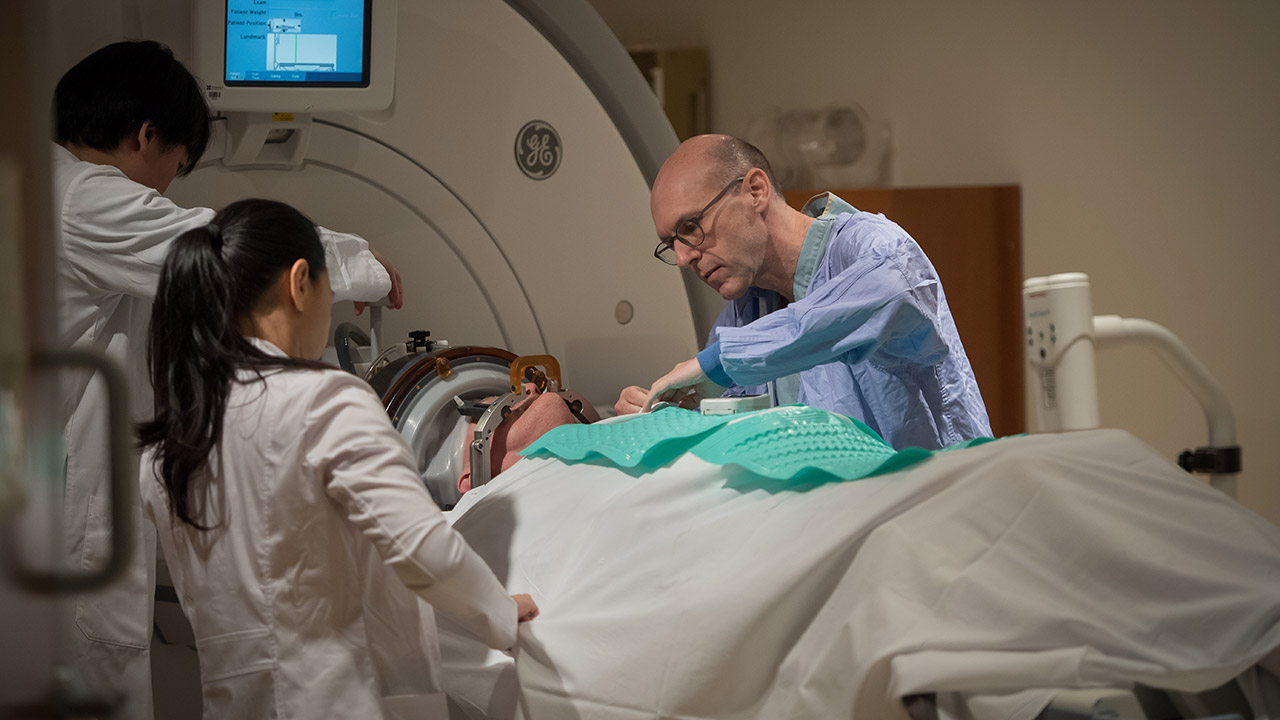First Alzheimer's patient treated with focused ultrasound to open the blood-brain barrier
Sunnybrook scientists have made history as they used focused ultrasound to safely and non-invasively breach the blood-brain barrier (BBB) temporarily in patients with Alzheimer’s disease (AD) in a clinical trial.
“There are many therapeutic drug treatments that do not work or cannot be properly tested in AD (in part) because they can not pass the BBB,” says Dr. Sandra Black, internationally renowned Brill Chair of Neurology at Sunnybrook Health Sciences Centre and University of Toronto, and a co-principal investigator of the new trial.
“By opening up the BBB using low frequency ultrasound, we’ve taken a small but important step that opens up a whole new vista of possibilities. The hope is there may be a way to eventually open up multiple little windows, in a gentle way, in order to get large molecules like drugs and even stem cells into the brain. But we need to take it one step at a time.”
The BBB is a protective barrier that surrounds the tiniest blood vessels in the brain (capillaries), preventing the passage of proteins and other potentially toxic substances from getting into the brain from the bloodstream. The challenge is that it also prevents the entry of sufficient amounts of drug therapies that could be effective in treating disease.
“Our goal with this Phase 1 trial is to investigate whether we can successfully and safely open the BBB in people with mild stage AD using the non-invasive method of MRI-guided focused ultrasound,” says Dr. Nir Lipsman, principal investigator of the trial and a neurosurgeon at Sunnybrook.
In November 2015, Sunnybrook researchers successfully and safely opened the BBB non-invasively for the first time, to test the ability to deliver chemotherapy directly into a patient’s brain tumour. This more recent trial is the first time the BBB was opened in patients with AD, although no drug therapies are being administered.
This phase of the trial will include six research participants who will undergo two sessions of focused ultrasound, various cognitive testing and imaging scans, including a PET scan which shows amyloid deposits linked to AD, in the brain. If this phase of the trial proves to be successful, the researchers will consider another trial to test introducing small amounts of drug therapies and potentially move to the part of the brain that is most affected by this disease – the hub for creating new memories, the hippocampus.
Dr. Kullervo Hynynen, Director of Physical Sciences at Sunnybrook Research Institute, worked with industry partner INSIGHTEC for almost two decades to develop the technology and bring it to a clinically-ready state. “Now that our focused ultrasound technology has successfully disrupted the blood-brain barrier, our collaborative efforts can be focused on delivering clinical solutions to help patients suffering from various brain diseases,” says Eyal Zadicario, INSIGHTEC General Manager.
“The ability to focally, temporarily, and repetitively breach the BBB to allow high concentrations of therapeutic agents to access the brain opens up a new frontier in treating a variety of brain disorders,” says Dr. Neal Kassell, chairman of the Focused Ultrasound Foundation. “Brain applications are a research priority for the Foundation, and these initial findings represent a small but critical step that could lead to a game-changing approach to treating one of the most challenging and least understood brain diseases.”
This study is funded by the Focused Ultrasound Foundation. The research equipment is funded by the Canada Foundation for Innovation, with support from the Bombardier Foundation. The research has also received significant support from the Canadian Institutes of Health Research, National Institutes of Health, and Ontario Ministry of Research, Innovation and Science. Philanthropic investment by the Weston Brain Institute, The Beamish Family Foundation, FDC Foundation, and the Connor family has been a major catalyst behind Sunnybrook’s advances in focused ultrasound technology and research.
Dr. Hynynen holds the Canada Research Chair in Imaging Systems and Image-Guided Therapeutics. The focused ultrasound technology is INSIGHTEC’s Exablate Neuro system.
-30-
Media contact:
Nadia Norcia Radovini
Sunnybrook Health Sciences Centre
416-480-4040
nadia.radovini@sunnybrook.ca
About the Focused Ultrasound Foundation
The Focused Ultrasound Foundation was created to improve the lives of millions of people worldwide by accelerating the development of focused ultrasound, an early-stage, noninvasive, therapeutic technology with the potential to transform the treatment of many serious medical disorders. The Foundation works to clear the path to global adoption by coordinating and funding research, fostering collaboration, and building awareness among patients and professionals. It is dedicated to ensuring that focused ultrasound finds its place as a mainstream therapy for a range of conditions within years, not decades. Since its establishment in 2006, the Foundation has become the largest non-governmental source of funding for focused ultrasound research. More information can be found at fusfoundation.org.
About INSIGHTEC
INSIGHTEC is the world leader and innovator of non-invasive MR-guided Focused Ultrasound (MRgFUS).The company is dedicated to improving patient lives by collaborating with physicians, medical institutions, academic researchers and regulatory bodies around the world. More information can be found at insightec.com/us/clinical/neurosurgery.
About Sunnybrook
Sunnybrook Health Sciences Centre is inventing the future of health care for the 1.2 million patients the hospital cares for each year through the dedication of its more than 10,000 staff and volunteers. An internationally recognized leader in research and education and a full affiliation with the University of Toronto distinguishes Sunnybrook as one of Canada’s premier academic health sciences centres. Sunnybrook specializes in caring for high-risk pregnancies, critically-ill newborns and adults, offering specialized rehabilitation and treating and preventing cancer, cardiovascular disease, neurological and psychiatric disorders, orthopaedic and arthritic conditions and traumatic injuries. The Hospital also has a unique and national leading program for the care of Canada’s war veterans.












